Why Everyone is Talking About Body Massage in London
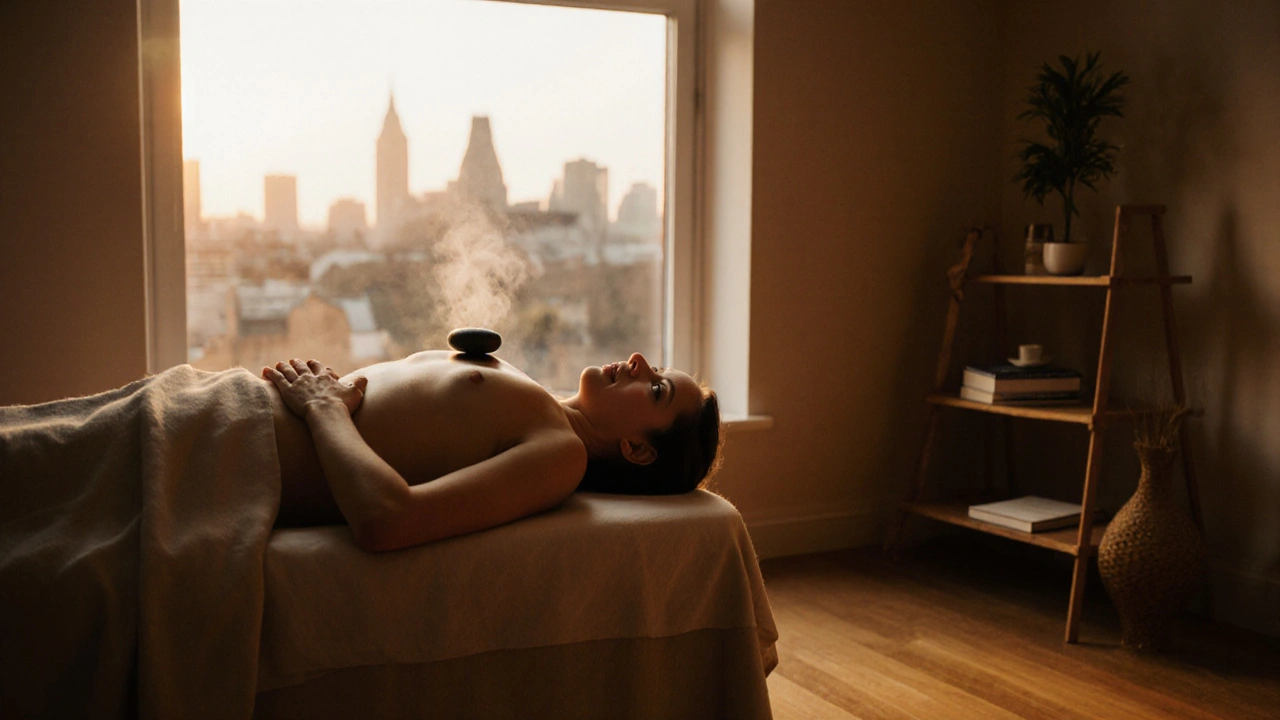
Walk through any neighborhood in London these days-Covent Garden, Notting Hill, Shoreditch-and you’ll see it: signs for body massage studios, glowing reviews on Google, people leaving with visibly relaxed shoulders. It’s not just a trend. It’s a shift. People aren’t just getting massages because they’re stressed. They’re doing it because they’ve finally realized how much their bodies have been holding onto.
What’s Really Behind the Body Massage Boom in London?
It’s not the ads. It’s not influencers. It’s the exhaustion. After years of remote work, long commutes, and the lingering mental load of pandemic life, Londoners are waking up to one simple truth: their bodies are screaming for relief. And massage isn’t a luxury anymore-it’s a reset button.
Think about it. How many people do you know who sit at desks for 10 hours a day, then scroll through their phones before bed? Their necks are tight. Their lower backs ache. Their shoulders are permanently hunched. A 60-minute body massage doesn’t just loosen muscles-it resets the nervous system. Studies from the University of Miami’s Touch Research Institute show that regular massage lowers cortisol by 31% and increases serotonin and dopamine. That’s not magic. That’s biology.
Londoners aren’t just booking massages for relaxation. They’re booking them for recovery. Office workers after back-to-back Zoom calls. Runners after weekend training. Nurses after 12-hour shifts. Even students cramming for exams. The common thread? They’re not looking for a spa fantasy. They’re looking for a real, physical reset.
What Type of Body Massage Are People Actually Choosing?
Not all body massages are the same. And Londoners are getting picky. The old-school Swedish massage? Still popular, sure. But it’s no longer the default. People now know what their bodies need-and they’re asking for it.
Deep tissue massage is up 42% since 2023, according to data from the London Massage Association. Why? Because people are finally admitting they carry tension in their fascia-the connective tissue that wraps around muscles. When it gets stuck, everything hurts. Deep tissue doesn’t just rub. It releases.
Hot stone massage? Also climbing. The heat from basalt stones penetrates deeper than hands alone. It’s especially popular among people with chronic lower back pain. One therapist in Camden told me she’s had three clients come back after years of avoiding massage because they thought it would hurt. They left crying-not from pain, but relief.
And then there’s the rise of integrative approaches. Many studios now combine massage with breathwork or guided mindfulness. It’s not about just touching muscles. It’s about helping people reconnect with their bodies. One place in Brixton even offers a 90-minute session that starts with a body scan meditation, moves into massage, and ends with a cup of herbal tea in silence. No music. No talking. Just presence.
Why Now? The Cultural Shift in London
London has always been a city that values productivity. But the cost of that mindset is showing up in the stats: 68% of Londoners report chronic muscle tension, according to a 2025 NHS survey. And mental health services are stretched thin. Massage is filling the gap-not as a replacement, but as a bridge.
There’s also a quiet rebellion happening. People are saying no to the idea that pain is normal. That tight shoulders? Not okay. That constant fatigue? Not just ‘being busy’. That’s your body asking for help. And massage is becoming the most accessible, non-pharmaceutical answer.
Therapists are seeing more men than ever before. Ten years ago, 80% of clients were women. Now it’s closer to 50-50. Young professionals, construction workers, even fathers picking up their kids from school-they’re all walking in. The stigma is fading. Massage isn’t ‘soft’. It’s smart.
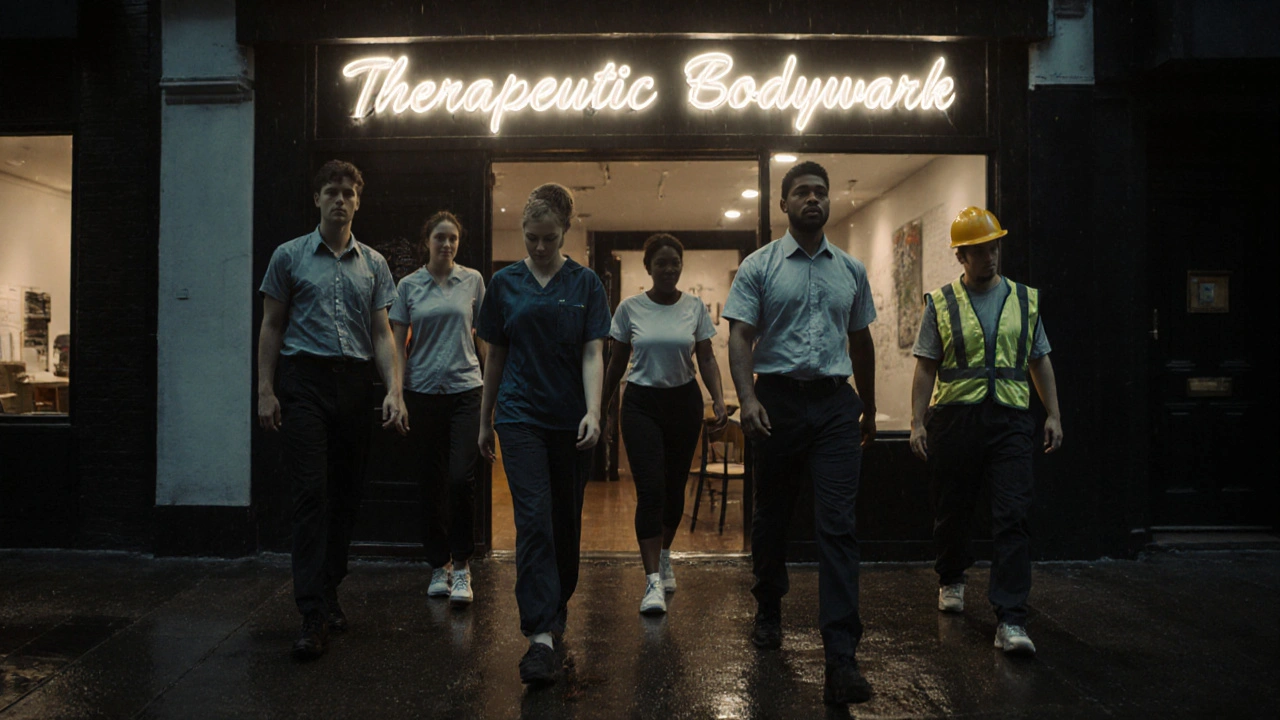
How to Find the Right Body Massage in London
Not every studio is the same. And you don’t want to waste an hour-and your money-on someone who doesn’t know what they’re doing.
Start by checking credentials. Look for therapists registered with the Complementary and Natural Healthcare Council (CNHC). It’s not mandatory, but it means they’ve met national standards for training and ethics. Avoid places that don’t list their therapist’s qualifications.
Read reviews-not the five-star ones that sound like ads. Look for the three-star reviews. What do people say about the pressure? Did the therapist ask about injuries? Did they adjust mid-session? Those details matter more than the number of stars.
Try a 30-minute taster session before committing to an hour. Most reputable places offer this. It’s not about selling you more. It’s about making sure your body and the therapist are a match.
And don’t be afraid to speak up. If the pressure’s too light or too hard, say so. A good therapist will adjust without hesitation. Massage isn’t a performance. It’s a conversation between your body and their hands.
What to Expect on Your First Visit
You don’t need to know anything. You don’t need to undress completely. Most therapists work with draping-you’re covered at all times, except for the area being worked on. If you’re uncomfortable, ask. That’s your right.
The session usually starts with a quick chat. Where does it hurt? What’s your goal? Relief? Recovery? Relaxation? The therapist will tailor the pressure and technique based on your answers.
During the massage, you might feel some discomfort-but not pain. A deep release can feel intense, like a good stretch. But if you’re wincing, tell them. A good massage should leave you feeling lighter, not bruised.
Afterward, drink water. Massage releases toxins stored in muscle tissue. Hydration helps flush them out. You might feel a little tired. That’s normal. Your nervous system just had a major recalibration.
Most people feel the difference after one session. But the real magic happens with consistency. One visit gives you a glimpse. Four visits in a month? That’s when your body starts to remember how to relax.
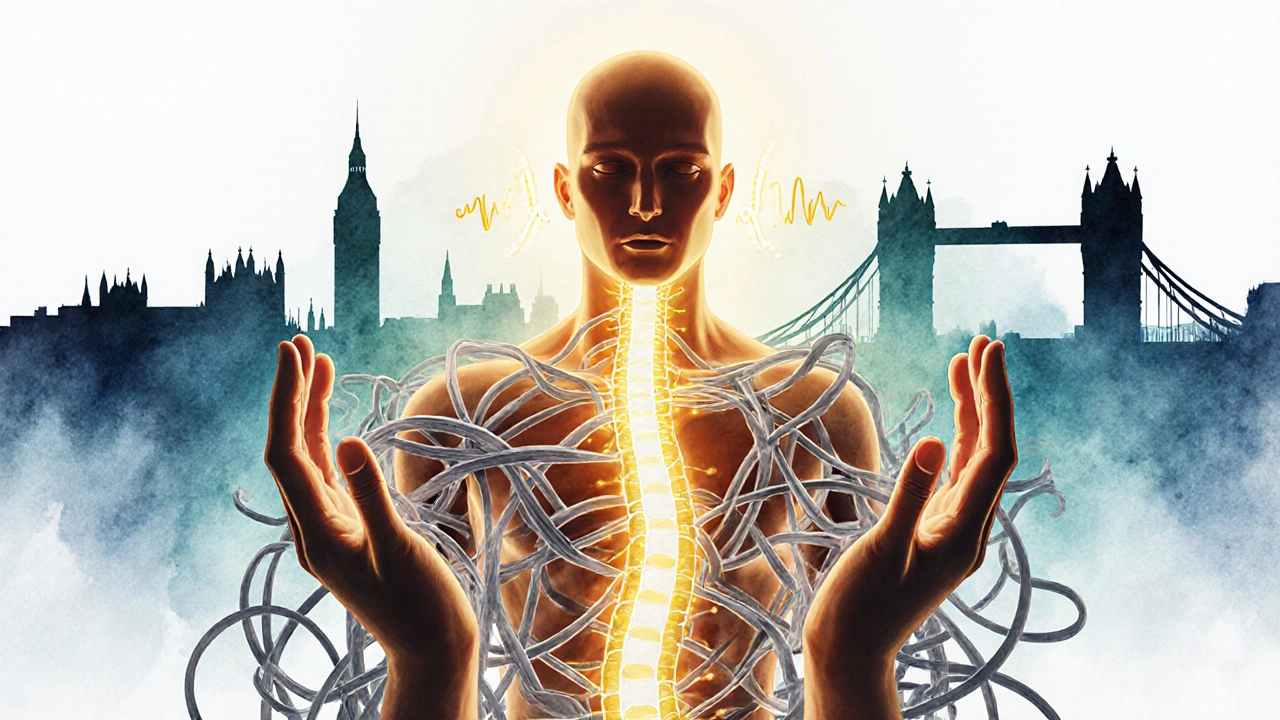
The Real Benefit Isn’t Just Physical
People think massage is about sore muscles. It’s not. It’s about reclaiming your body.
When you’re constantly in fight-or-flight mode-checking emails, rushing trains, scrolling feeds-your body stays on high alert. Massage tells your nervous system: You’re safe now. And once that message gets through, everything else starts to heal.
One client, a 42-year-old project manager in Canary Wharf, told me she used to take sleeping pills just to get through the night. After six weeks of weekly body massages, she stopped them. Not because she was cured. But because she finally felt like she could rest.
That’s the quiet revolution happening in London. It’s not about luxury. It’s about survival. Your body isn’t broken. It’s just tired. And sometimes, the best thing you can do is lie down, breathe, and let someone else hold the weight for an hour.
Is Body Massage Worth It in London?
Prices range from £45 for a 30-minute session at a chain studio to £120 for an hour with a specialist in a private clinic. Is it expensive? Yes. But compare it to the cost of ongoing physio, painkillers, lost sleep, or missed workdays.
Think of it as preventative healthcare. One massage a month costs less than two takeout coffees a week. And it does more than caffeine ever could.
Londoners aren’t just talking about body massage because it’s trendy. They’re talking about it because it works. And for the first time in a long time, they’re finally listening to what their bodies have been trying to say.
Is body massage in London safe for everyone?
Most people can safely enjoy body massage, but there are exceptions. If you have deep vein thrombosis, open wounds, recent surgery, or are in the first trimester of pregnancy without clearance from your doctor, you should avoid it. Always tell your therapist about any medical conditions or medications you’re taking. A good therapist will know how to adapt or refer you elsewhere.
How often should I get a body massage in London?
For general stress relief, once a month is enough to maintain balance. If you have chronic pain, intense physical activity, or high stress levels, once every two weeks helps. Many regular clients book weekly for a month, then taper off. The goal isn’t dependency-it’s regulation. Your body learns to stay relaxed longer between sessions.
Do I need to undress completely for a body massage?
No. Most therapists use draping techniques to keep you covered at all times. You can keep your underwear on if that makes you more comfortable. The therapist will only uncover the area they’re working on, and they’ll always ask before adjusting. Your comfort comes first.
Can body massage help with back pain?
Yes, especially if the pain comes from muscle tension or poor posture. Deep tissue and myofascial release techniques target the tight muscles and connective tissue pulling on your spine. It won’t fix a herniated disc, but it can reduce the muscle spasms that make the pain worse. Many physiotherapists in London now refer patients to massage therapists as part of a recovery plan.
What’s the difference between a spa massage and a therapeutic body massage?
Spa massages focus on relaxation and ambiance-soft music, candles, maybe aromatherapy. Therapeutic body massage focuses on your body’s needs: tension points, mobility, injury recovery. The therapist asks questions, adjusts pressure, and uses specific techniques. One is a treat. The other is a tool for healing. Many London studios now blend both.
Are there any side effects after a body massage?
Some people feel slightly sore the next day, especially after deep tissue work. That’s normal and usually fades within 24-48 hours. Others feel unusually tired or emotional-that’s your nervous system releasing stored stress. Drink water, rest, and don’t schedule anything intense right after. Rarely, bruising can happen with very deep pressure. If you feel sharp pain, dizziness, or swelling, contact your therapist or doctor.
Body massage in London isn’t just a service. It’s a quiet act of self-respect. And more people are choosing it every day-not because it’s popular, but because they finally understand how much their bodies deserve to be heard.

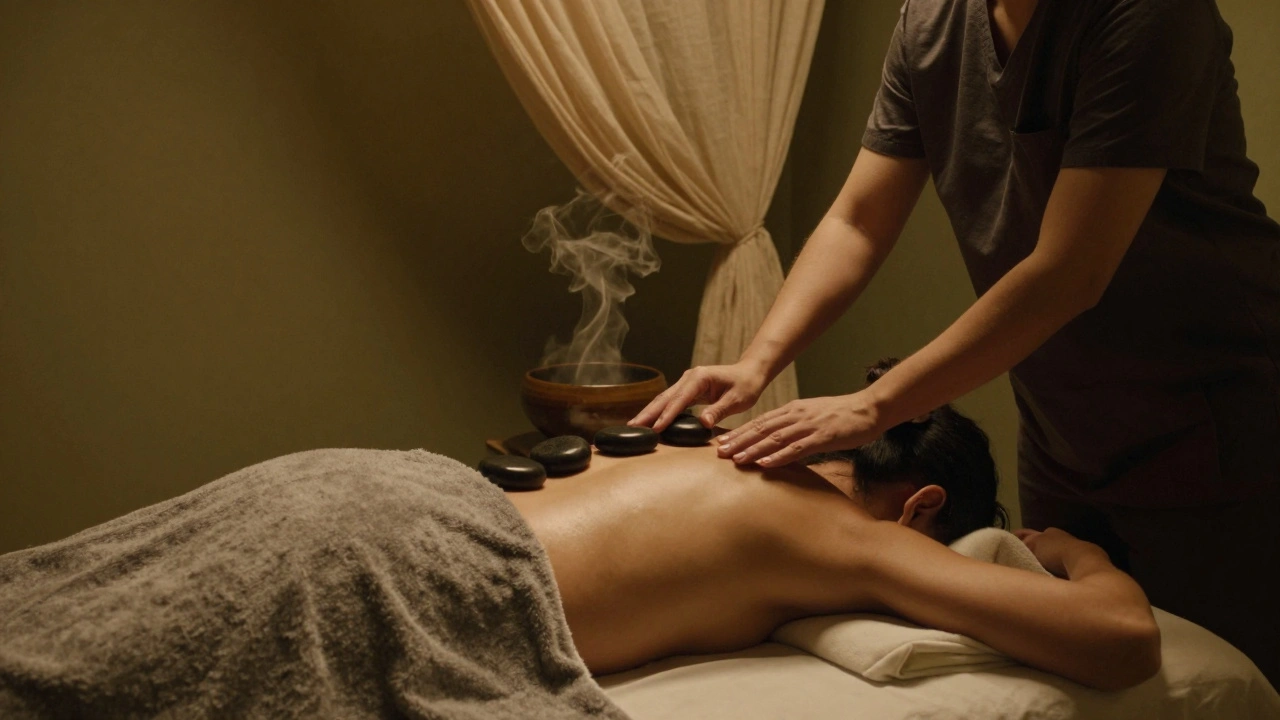

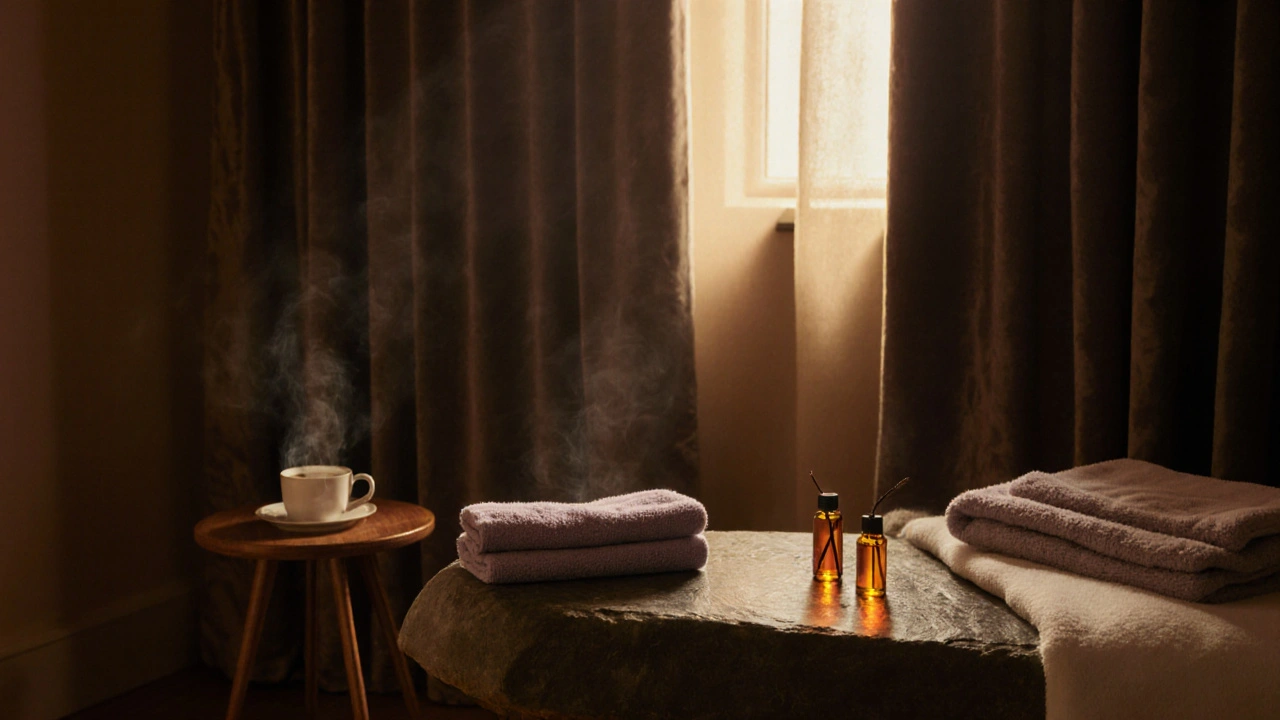
M. D. Crosson
November 3, 2025 AT 11:44This is exactly what I needed to hear today! I’ve been carrying tension in my shoulders since 2020, and I thought it was just ‘normal’-turns out, it’s not! I booked my first deep tissue session last week, and honestly? I cried halfway through. Not from pain-from relief. My body finally felt like it could breathe again. I’m doing this every two weeks now. No more ibuprofen. No more ‘I’ll just stretch.’ Just me, a therapist, and a quiet room. Life-changing.
Pranav Brahrunesh
November 4, 2025 AT 20:03Everyone’s talking about massage like it’s some magical cure but nobody’s asking who’s really behind this boom. Big Pharma doesn’t want you healing naturally. Massage therapists are unregulated in 80% of London studios. The CNHC? A marketing ploy. They’re all funded by wellness conglomerates pushing a narrative that you’re broken unless you pay £90 an hour. They’re replacing real healthcare with expensive rituals. And don’t get me started on the breathwork nonsense-that’s just hypnosis with lavender oil. Your body doesn’t need a spa fantasy. It needs real medicine. But no one wants to admit that anymore. We’ve become a society of emotional consumers trading pain for pretty experiences.
Kara Bysterbusch
November 5, 2025 AT 07:21I’ve seen this before. The ‘massage as self-care’ trend always peaks right before another economic crash. People are desperate to feel something other than dread. But let’s be real-most of these therapists are undertrained, overpriced, and use the same 5 techniques on everyone. The ‘body scan meditation’ part? Pure theater. If you’re paying £120 to sit in silence, you’re being scammed. Save your money. Get a foam roller. Or better yet-stop sitting all day.
Satpal Dagar
November 7, 2025 AT 01:37While I appreciate the sentiment, the article romanticizes a commodified form of somatic capitalism that has been co-opted by neoliberal wellness culture. The notion that massage constitutes ‘self-respect’ is a bourgeois illusion-particularly when one considers the precarity of the therapists themselves, who often work on zero-hours contracts in gentrified neighborhoods like Brixton and Shoreditch, charging £85/hour while earning £12 after platform fees. The integration of mindfulness, while aesthetically appealing, is a performative gesture that distracts from structural issues: wage stagnation, housing insecurity, and the erosion of public healthcare. The real ‘quiet rebellion’ is not lying on a table with basalt stones-it’s demanding universal access to physiotherapy through the NHS, not privatized relaxation rituals that profit from collective exhaustion.
Aaron Lovelock
November 7, 2025 AT 14:37There are significant medical and regulatory concerns here. The article cites the University of Miami’s Touch Research Institute, which has been criticized for methodological flaws and small sample sizes. Additionally, the claim that massage lowers cortisol by 31% is not consistently replicated in peer-reviewed literature. Furthermore, the promotion of massage as a substitute for medical intervention-especially for chronic pain-is dangerous. The NHS does not endorse massage as a primary treatment for musculoskeletal conditions. The rise in popularity is not evidence of efficacy-it is evidence of a cultural shift toward pseudoscientific self-medication. This trend is not a revolution. It is a regression.
Alex Bor
November 9, 2025 AT 13:24I tried a massage last month after reading this and honestly it was weirdly emotional I didn’t expect to cry but I did like after 10 minutes my therapist asked if I wanted to talk and I said no but then I just started sobbing quietly and she didn’t say anything just kept working and it felt like my body had been holding onto something for years and she just unlocked it somehow I don’t know how to explain it but I’ve never felt that before and now I’m hooked I’m doing it every two weeks and I swear I sleep better I don’t even need my earplugs anymore
Piotr Williams
November 10, 2025 AT 21:07Yeah, sure. Massage is great. But why is everyone acting like this is new? My dad got massages in the 90s in Lagos. We called it ‘body work.’ No breathwork. No crystals. Just hands and oil. Now it’s a £100 experience with a name like ‘SoulRealign™.’ It’s not healing. It’s branding. And the people who need it most can’t afford it. Meanwhile, the rich get their cortisol lowered while the rest of us just keep scrolling.